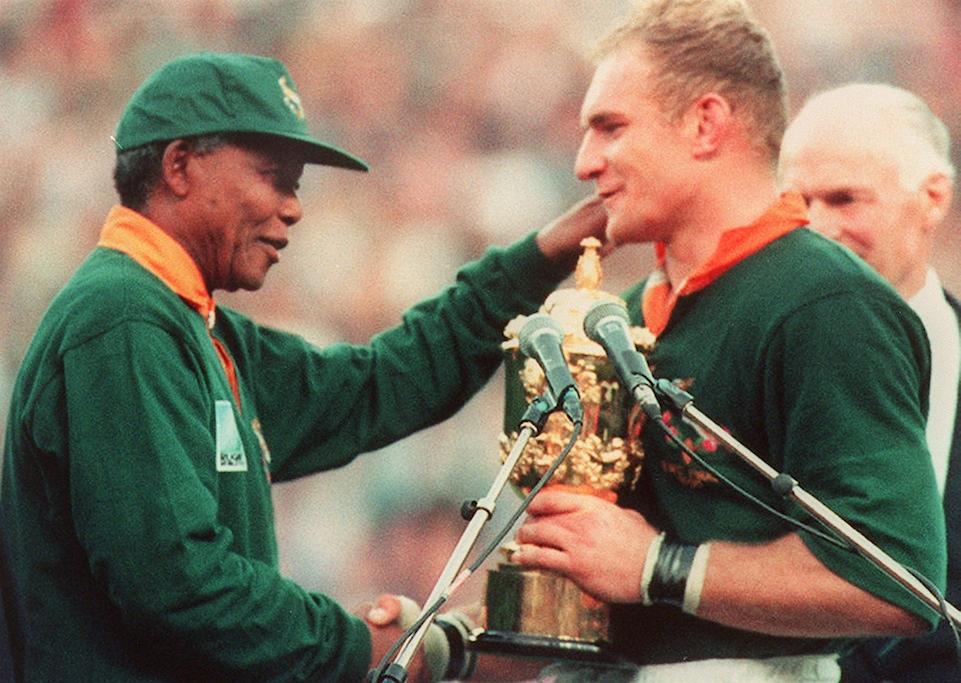Mandela’s other legacy: The real-life ‘Invictus’ story
Nelson Mandela congratulates South Africa’s rugby team captain François Pienaar after his team’s victory over New Zealand in the final of the Rugby World Cup in Johannesburg on June 24, 1995.
JOHANNESBURG, South Africa – Growing up under apartheid in a rural Afrikaans community, young Francois Pienaar would hear talk about the “bad man.”
The name of this man, Nelson Mandela, came up often in conversations among adults, and was usually twinned with the word “terrorist” – creating a powerful impression on children listening nearby.
“What you believe is what you hear around the barbecue fires,” Pienaar, now 46, recalled during an October youth conference in Johannesburg. “That if this person comes out of jail there will be serious issues in South Africa.”
Pienaar famously led South Africa’s national rugby team, the Springboks, to victory at the World Cup in 1995, a year after Mandela became the country’s first democratically elected president.
Rugby, beloved by the Afrikaners — the descendants of Dutch settlers in South Africa — was considered by many blacks to be a symbol of racist white minority rule. For years South African sports teams had been excluded from international competitions due to boycotts.
But Mandela championed the Springboks, seeing it as a unifying moment for the new “Rainbow Nation.” This inspirational story of reconciliation was recounted in the 2009 film “Invictus,” in which Pienaar is played by Matt Damon and Mandela by Morgan Freeman.
These days, Pienaar tears up when he talks about his relationship with Mandela, and the former president’s legacy in South Africa.
Any whispers that this country will fall into chaos after Mandela’s death are simply “unfounded,” he said.
“I think South Africans have in the last number of years come to grips with the fact that Madiba will pass,” Pienaar told GlobalPost, referring to Mandela by his Xhosa clan name as a term of respect.
“What I say to people is that I hope that his passing is a celebration and a tremendous reflection,” he said. “If it wasn’t for Nelson Mandela, we would not have been set on this path.”
More from GlobalPost: Death of Nelson Mandela (FULL COVERAGE)
For Pienaar, everything changed when in 1994 he received an unexpected call from Mandela’s personal secretary, inviting him for tea with the president at the Union Buildings in Pretoria.
Pienaar recalls hearing Mandela’s distinctive, booming voice, saying “Ah, Francois, is he there?” and then the office doors opening. Mandela’s imposing height was a surprise on their first meeting, as was the sense of warmth he exuded.
“I felt safe,” Pienaar said. “I felt like I was in the presence of a very, very wise person.”
Mandela saw the power of sports on South African hearts and minds, and with Pienaar on side, cleverly used it to build bridges in a divided nation.
But two decades later some South Africans feel that sports haven’t been transformed, with players and fans still largely divided along racial lines — mainly, rugby being a white sport, and soccer a black one.
“There’s more than needs to be done at grassroots levels in certain sectors, most definitely,” Pienaar said. “That I don’t argue with. But we’re also not celebrating some of the good stuff that has been done in other sectors and sporting codes.”
“In this country sports will always be under a magnifying glass. And I understand that. But one needs to understand what does success look like, and then go and drill down to what has been done,” he said.
“It needs to start at grassroots, and at elite level it needs to be on merit. That’s what I would look at if I was the engineer,” he added.
Pienaar said he is also concerned about the current void in strong leadership in South Africa. While there are young people with a lot of potential, they are held back by a poor education system, he said.
Mandela and Pienaar last saw each other four years ago, a reunion the former rugby player described as “very emotional, very special.”
“I decided then that I would say my goodbye,” he said. “But I’ve kept in contact and heard about his health and so forth.”
Pienaar said he was deeply touched that Mandela kept in contact long after the rugby World Cup. For example, Mandela called Pienaar and his wife to congratulate them on the birth of their first child, and to give the boy a Xhosa name.
“Having had the opportunities to experience things that very few have — I’ve very blessed. Very, very blessed,” Pienaar said.
“We have a relationship that I don’t gush about and haven’t for the last number years because it’s so special. Incredible, deep respect.”
Visit NBCNews.com for breaking news, world news, and news about the economy
